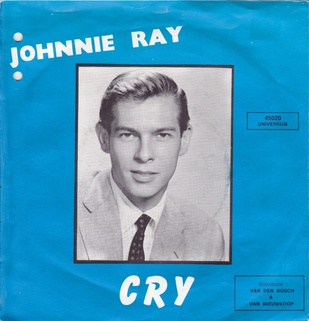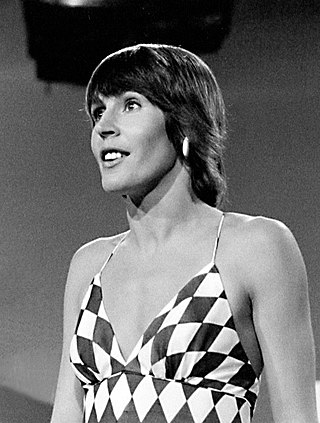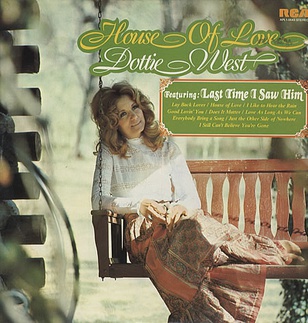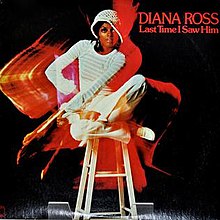
"Theme from Mahogany" is a song written by Michael Masser and Gerry Goffin and produced by Masser. It was initially recorded by American singer Thelma Houston in 1973, and then by Diana Ross as the theme to the 1975 Motown/Paramount film Mahogany that also starred Ross. The song was released on September 24, 1975 by Motown Records as the lead single for both the film's soundtrack and Ross' seventh studio album, Diana Ross. Masser and Goffin received a nomination for Best Original Song at the 48th Academy Awards. Also, the song was nominated for AFI's 100 Years...100 Songs list constructed by the American Film Institute in 2004.
"I Don't See Me in Your Eyes Anymore" is a popular song, written by Bennie Benjamin and George David Weiss and published in 1949. The song was popularized that year by Gordon Jenkins and His Orchestra and by Perry Como.

"Touch Me in the Morning" is a song recorded by Diana Ross on the Motown label. It was written by Ron Miller and Michael Masser, and produced by the latter and Tom Baird. It was released on May 3, 1973 as the first single from her album of the same name. In 1973, it became Ross's second solo No. 1 single on the Billboard Hot 100.

"Cry" is a 1951 popular song written by Churchill Kohlman. The song was first recorded by Ruth Casey on the Cadillac label. The biggest hit version was recorded in New York City by Johnnie Ray and The Four Lads on October 16, 1951. Singer Ronnie Dove also had a big hit with the song in 1966.

"Missing You" is a song performed by American singer Diana Ross, recorded for her 1984 album Swept Away. The song was written, composed, and produced by Lionel Richie as a tribute to Marvin Gaye, who was murdered by his father earlier that year. The memorial song was released as the album's fourth single on November 13, 1984, by RCA. Richie also provided background vocals on the song.

"All I Ever Need Is You" is a popular song written by Jimmy Holiday and Eddie Reeves, and initially recorded by Ray Charles for his 1971 album, Volcanic Action of My Soul. The most well-known version of the song is the hit single by Sonny & Cher which, in 1971, reached No. 7 on the U.S. Billboard Hot 100, and was their single of greatest chart longevity, spending 15 weeks on that chart. Their album by the same title sold over 500,000 copies reaching RIAA gold status.

"Help Me Make It Through The Night" is a country music ballad written and composed by Kris Kristofferson and released on his 1970 album Kristofferson. It was covered later in 1970 by Sammi Smith, on the album Help Me Make It Through the Night.

Last Time I Saw Him is the fifth studio album by American singer Diana Ross, released on December 6, 1973 by Motown Records. It reached #52 in the USA and sold over 200,000 copies. It also helped Ross win the 1974 American Music Award for Favorite R&B Female.

"I Won't Last a Day Without You" is a song by The Carpenters with lyrics written by Paul Williams and music composed by Roger Nichols. It was released in the U.K. in September 1972, paired with "Goodbye to Love" as a double-A side. The single reached No. 9 and spent 14 weeks on the chart. It was later released in the U.S. and became a hit single for them in 1974, reaching No. 11 on the Billboard Hot 100 chart and number one on the easy listening chart. It was the Carpenters' ninth No. 1 on the easy listening chart.

"Love Will Keep Us Together" is a song written by Neil Sedaka and Howard Greenfield. It was first recorded by Sedaka in 1973. The brother-sister duo Mac and Katie Kissoon recorded their version in 1973. American pop duo Captain & Tennille covered it in 1975, with instrumental backing almost entirely by “Captain” Daryl Dragon, with the exception of drums played by Hal Blaine; their version became a worldwide hit.

"What Are We Doin' in Love" is a song written by Randy Goodrum and recorded by American country music artist Dottie West. Although not credited on the single release, the song also features American country and pop recording artist Kenny Rogers. It was released in March 1981 as the second single from the album Wild West. The song was West and Rogers' third and final number one on the country chart.

Country Sunshine is a studio album by American country music artist Dottie West. It was released in November 1973 on RCA Victor Records. The album's ten tracks were produced by Billy Davis. Her 21st studio recording, Country Sunshine was released following the success of the title track. The song became a major hit after first being part of a Coca-Cola commercial. The album itself would reach major positions on national publication charts following its release.

"Keep on Singing" is a 1973 song composed by Danny Janssen and Bobby Hart, and was originally recorded by Austin Roberts from the album Austin Roberts. It was released as a single on Chelsea Records and reached No. 50 on the U.S. Billboard Hot 100 and No. 39 on the Cash Box Top 100. In Canada it reached # 79. "Keep on Singing" was best known as a hit single by Helen Reddy in 1974.

"(I'd Be) A Legend in My Time" is a song written and recorded by Don Gibson in 1960. It appeared as the B-side of his hit "Far Far Away", from the album Sweet Dreams. Gibson re-recorded the song on the 1972 album Country Green.

"Let Me Be the One" is a song written in 1970 by Roger Nichols and Paul Williams. It was first recorded by Nanette Workman and released in 1970 as a single on Columbia Records. The Carpenters' version first appeared on their 1971 album Carpenters.

Australian-American singer Helen Reddy (1941–2020), often referred to as the "Queen of 70s Pop", recorded 18 studio albums, seven of which have achieved sales of 500,000 units in the US for which they were awarded Gold certification by the Recording Industry Association of America. One of those seven, I Am Woman, eventually went Platinum by reaching sales of one million copies, and her first compilation album, Helen Reddy's Greatest Hits, was awarded Double Platinum status in 1992 for hitting the two million sales mark. The respective US and Canadian album charts in Billboard and RPM magazine each had appearances by 10 of these LPs during the 1970s.

"Sweet Music Man" is a song written and recorded by American musician Kenny Rogers. It appears on his 1977 album Daytime Friends, from which it was released as the final single.

House of Love is a studio album by American country music artist Dottie West. It was released in May 1974 on RCA Victor Records and was produced by Billy Davis. It was West's 22nd studio recording in her music career and contained ten tracks. Among its singles was the song "Last Time I Saw", which became a top ten hit in 1974.

The singles discography of American country artist Dottie West contains 59 singles released as a solo artist, 12 singles released as a collaborative artist, 3 promotional singles and 1 other charting song. West signed with RCA Victor Records in 1963, having her first Top 40 hit the same year. It was followed in 1964 by "Love Is No Excuse", a duet with Jim Reeves that became West's first top 10 hit. In 1964, she also released "Here Comes My Baby". The song reached number 10 on the Billboard Hot Country Singles chart and became the first song by a female country artist to win a Grammy award. From her 1966 album, West issued four singles, including the top 10 hits "Would You Hold It Against Me" and "What's Come Over My Baby". Over the next two years she had major hits with "Paper Mansions", "Like a Fool", "Country Girl", and "Reno". In 1969, West collaborated with Don Gibson on "Rings of Gold", which reached number 2 on the Billboard country chart. In 1973, she released a single version of a commercial jingle originally used by The Coca-Cola Company. Entitled "Country Sunshine", the song became West's biggest hit, reaching number 2 on the country songs chart and number 49 on the Billboard Hot 100. The song also nominated her for her eleventh Grammy. After releasing the top 10 hit "Last Time I Saw Him" (1974), West's chart hits declined and she was dropped from RCA in 1976.

"This Is Your Song" is a song written by Paul Anka, originally recorded as the B-side of his non-album single, "While We're Still Young", and produced by Arif Mardin in 1972, during Anka's short period on Buddah Records. That single fell just short of the top ten on the Canadian pop chart. But Anka offered the song to his protege, pop singer/songwriter Don Goodwin in 1973. Goodwin grew up in Aspen, Colorado, and was discovered by Paul Anka in Las Vegas.



















